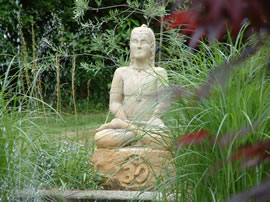Yoga: The Undivided Truth – Swami Indrananda
Every scripture tells us that ‘Truth’ is eternal. It may, as the wise men say, be expressed differently by different people, but it remains the same. The following article was written by me for the magazine in 1985, and it will be seen that the same thoughts are prevalent today after 15 years amongst us. ‘Truth’ has remained the same in the past, is in the present, and will be in the future. The strength of a sincere student of Yoga is to adhere to ‘Truth’ in all circumstances.My last article ‘Opportunity or Opportunist’ has attracted a number of comments. The views expressed are the reflections of my personal experience and I want to share them with you from time to time. It is possible that some of you may disagree with me.
I feel privileged to be an instrument of the Lord to convey the message of Yoga during my visits to various parts of the country. During my travels I experience many aspects of Truth. Satya or Truthfulness is the second Yama in the eight-fold steps of Maharishi Patanjali. And in my opinion one must climb the ladder of Yoga step by step. There is always a danger of falling down if one wants to jump too high without proper training.
It has been said time and again by the realised Masters that it is difficult to judge a person on face value. Perhaps this was one of the reasons for Gurukulas (family of the Guru) or an Ashram life where the Master could see the truth in his disciple through constant supervision.
Sri Swami Krishnananda Ji (of Sivananda Ashram, Rishikesh) says in his book ‘Yoga as a Universal Science’ that “in ancient times, the system of teaching was through the programme called ‘Gurukulasvasa’, a system altogether different from the one followed in our schools these days. The Guru or the teacher, the guide or the master, is expected to know every little detail of the mind of the student, because only then can he teach that which is appropriate under the circumstances. And if the student goes astray, the Guru will know what has happened to him and what remedy there is.” Although he further says that in modern times, circumstances being different, this system does not seem to work, I feel the same old tradition is still kept alive in many Ashramas like his and other spiritual organisations. In the Ramakrishna Vedanta Mission, a disciple has to stay with the Master(s) for 12 years to complete his studies and be ordained as a Monk.
I agree with Swami Ji when he says that serious study of Yoga has almost become either an academic affair or a joke practically. Orange robes and changing names are becoming the fashion of the day, and ethics and morality are being judged on the clothes one wears and the name one bears. Perhaps we have forgotten the words of Sri Swami Vivekananda Ji who was the first Monk to spread the message of Yoga in the west. He once told the Americans who were laughing at his dress that “in your country the tailor makes the man whereas in my country it is the character which makes the man.”
Sometimes we live in two different worlds. Our behaviour in a Yoga class, at a seminar or retreat is different from when we are away from the yogic atmosphere. The truth is only revealed when we have an opportunity to stay together for a while. This was revealed to me while I was leading a group of students to India. I could easily judge from a yogic point of view the strong as well as the weak points of my colleagues and they could observe mine. No matter how much one tries, one cannot conceal the truth.
But the tragedy is that we go to great lengths to justify our own behaviour and actions even though they conflict with the truth of the scriptures or declarations of the Masters of yore who realised the truth. Swami Krishnananda Ji has called it self-affirmation, and described it as dangerous and obstructive in following the true path of Yoga. Often we look at things from our own standpoint, and judge them according to our limited capabilities and development; we do not observe them from a higher angle or in relation to the examples set before us by those experienced and realised Masters. There is no need for self-justification when things are done righteously as it is said “actions speak for themselves”
Yoga, as Swami Krishnananda Ji says, is an internal adjustment rather than an external practice. And Yama and Niyama are not merely ethics and morality, they are scientific requirements and logical stages which are unavoidable in one’s life. Therefore, let us (teachers and students alike) practise self-analysis and eradicate the evils within through the practice of ethics and morals described in the treatises of Yoga and experience the Truth.
TO FOLLOW THE PATH OF RIGHTEOUSNESS AND ATTAIN REALISATION
OM SHANTI SHANTI SHANTI OM
